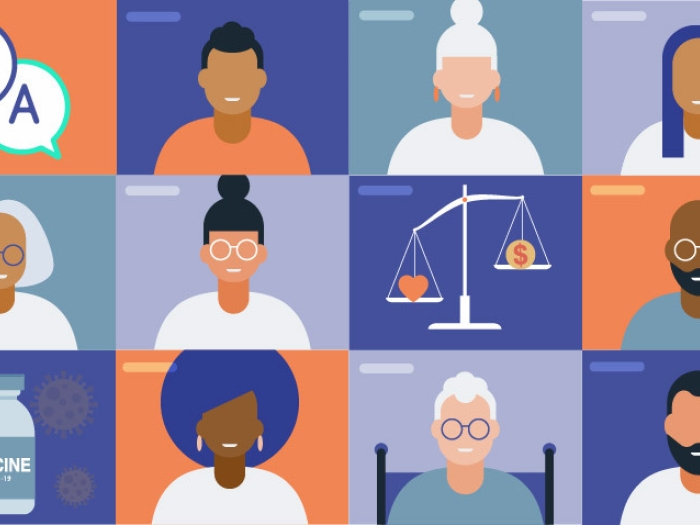New reports recommend Medicare consider patients’ education level, income, marital status and other health-affecting circumstances when paying or grading health care providers.
7:00 AM
Author |

Every day, the Medicare system pays certain doctors and hospitals a bit more, or judges them a bit differently, because their patients are sicker than national averages.
After all, it's more complicated to care for someone with diabetes and heart disease than a person with diabetes alone.
MORE FROM THE LAB: Subscribe to our weekly newsletter
But if the person with just diabetes is also poor and never graduated high school, or is unmarried and lives in a rural area, he or she might have a harder time with care than someone with several health problems but more income, more education, a spouse or less distance to travel for care.
It's time for the Medicare system to start taking these nonmedical social risk factors into account when it decides how to pay or grade hospitals and other health care providers, two experts on the topic say in a Perspective piece in the New England Journal of Medicine. Doing so could incentivize better care for all patients in the new age of value-based, quality-driven Medicare payments.
"As our nation works to make health care more patient-centered and value-based, Medicare can support these goals by making sure we reward those who do a good job taking care of disadvantaged patients," says author John Ayanian, M.D., M.P.P., director of the University of Michigan Institute for Healthcare Policy and Innovation.
Their piece highlights a recent National Academies of Sciences, Engineering, and Medicine report, to which Ayanian and his NEJM co-author, Melinda Buntin, Ph.D., contributed. The report reviews a wide range of studies about social risk factors and health, and it considers whether Medicare could use such risk factors, also called social determinants of health, in its payments and quality reporting.
"These findings are important because they lay out how to account for social risk factors and strengthen incentives to deliver high-quality care to disadvantaged groups," says Buntin, chair of the Vanderbilt University School of Medicine's Department of Health Policy. "Previously some argued you could only do one or the other."
The NEJM piece by Buntin and Ayanian appears in the journal alongside one written by a federal government team that came to similar conclusions after reviewing the issue.
As our nation works to make health care more patient-centered and value-based, Medicare can support these goals by making sure we reward those who do a good job taking care of disadvantaged patients.John Ayanian, M.D., M.P.P.
Social risk factors: knowns and unknowns
A wide range of research now shows that many social risk factors can affect a person's health. But because the Medicare system doesn't collect information on most of those factors, researchers say a new data-collection effort is needed. They call for better data on many factors, and more research on some.
SEE ALSO: Study: Medicare Readmission Penalties Need to Weigh Socioeconomic Factors
They also note Medicare could start using some social factors it already tracks to adjust Medicare payments and quality measurements. This could help the hospitals and providers taking care of disadvantaged people have a more level playing field, even though they can't control a patient's social risk factors.
For instance, the Medicare system already knows which patients are dual eligible — old or disabled enough to quality for Medicare and poor enough to qualify for Medicaid. It also knows which people live in rural or urban areas and where Medicare participants were born. Dual-eligible status is the most consistent of all social risk factors in predicting which patients will have the worst outcomes, the federal report notes.
The National Academies committee also recommends that Medicare ask all new enrollees, and even existing ones, about their racial and ethnic backgrounds, education, whether they have a spouse or partner, and their preferred language. All of these factors affect someone's health outcomes, according to independent research the committee reviewed.
At the same time, Buntin and Ayanian say, not enough is known about how to gauge factors such as wealth or social support, nor about the impact on health of sexual orientation or how fully someone has adapted to American culture if he or she came to the U.S. as an immigrant. More research is needed on these and other factors, they and the other authors of the National Academies report conclude.
The National Academies report and the federal report covered in the other new NEJM piece both grew out of a 2014 federal law, the Improving Medicare Post-Acute Care Transformation Act. A more recent law, the 21st Century Cures Act, also calls for Medicare to account for dual-eligible status when it sets penalties for hospitals whose patients are readmitted within 30 days of a hospital stay.
Bipartisan agreement exists, the authors say, about the need to reduce disparities in access, quality and outcomes; to improve quality and efficient care delivery for all patients; to promote fair and accurate reporting of data about social risk factors among the patients of hospitals or providers; and to compensate providers fairly when they do take care of more people with social risk factors.
If Medicare takes social risk factors into account, it should be done in all aspects of the payment and quality assessment and reporting system, they say, and in a way that rewards high-quality, high-value care for these patients but does not "excuse" suboptimal care.
They note that even now, some safety-net providers do an excellent job. But many hospitals and providers that disproportionately serve beneficiaries with social risk factors perform worse on quality measures — often because of circumstances they can't control.

Explore a variety of health care news & stories by visiting the Health Lab home page for more articles.

Department of Communication at Michigan Medicine
Want top health & research news weekly? Sign up for Health Lab’s newsletters today!





